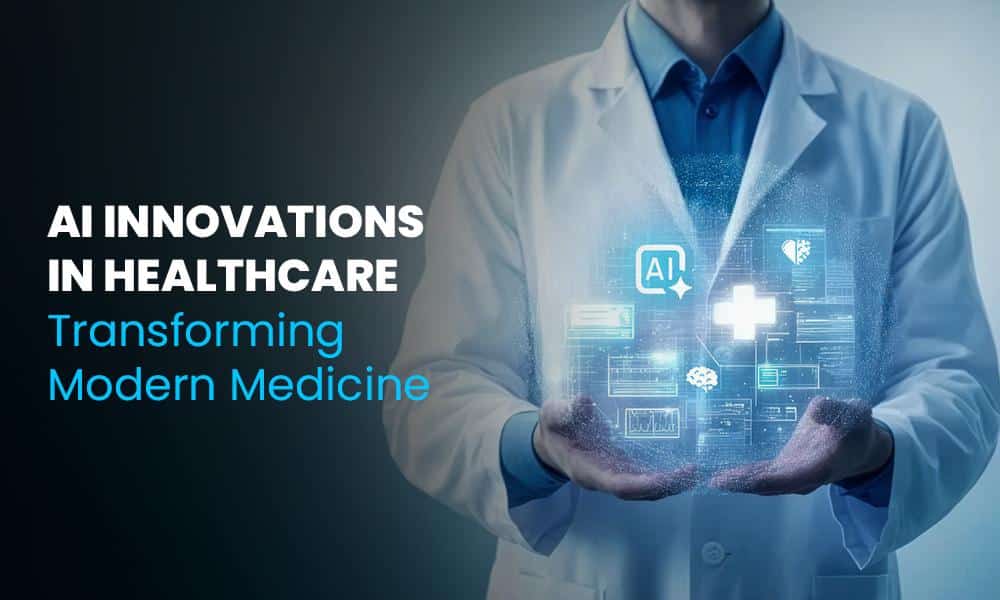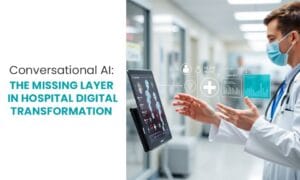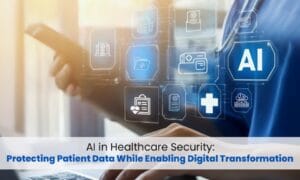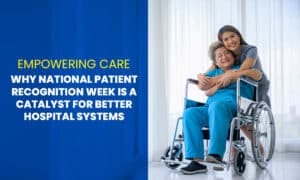
Imagine a world where your smartphone can detect skin cancer more accurately than a dermatologist, or where artificial intelligence predicts heart attacks days before they happen. This isn’t science fiction, it’s the remarkable reality of today’s AI innovations in healthcare. From London’s cutting-edge research hospitals to local GP surgeries across Britain, artificial intelligence is quietly revolutionising how we diagnose, treat, and prevent diseases.
The evolution of AI in healthcare has accelerated dramatically, transforming from simple computer programs in the 1970s to sophisticated systems that can analyse millions of medical images in seconds. What makes these AI innovations in healthcare particularly exciting is their accessibility—technologies once reserved for major medical centres are now reaching community clinics and even our homes. Whether it’s a virtual nurse assistant helping manage chronic conditions or an algorithm that spots early signs of dementia from voice patterns, the diverse types of AI in healthcare are creating opportunities we never thought possible. These breakthrough AI innovations in healthcare aren’t replacing doctors and nurses; instead, they’re empowering healthcare professionals with superhuman analytical capabilities whilst freeing them to focus on what matters most—caring for patients. The question isn’t whether AI will change healthcare, but how quickly we can harness these innovations to improve lives across the NHS and beyond.
The Evolution of AI in Healthcare: From Simple Programs to Smart Systems
Key milestones in AI healthcare development:
- 1970s: MYCIN system for antibiotic recommendations
- 1980s: Expert systems for medical diagnosis support
- 1990s: Neural networks for medical image analysis
- 2000s: Electronic health records enable data-driven insights
- 2010s: Machine learning algorithms achieve specialist-level accuracy
- 2020s: AI integration becomes mainstream across healthcare systems
How we got here: The evolution of AI in healthcare tells a fascinating story of gradual progress punctuated by revolutionary breakthroughs. Unlike other industries where AI seemed to appear overnight, healthcare AI has been decades in the making, building trust through careful validation and rigorous testing.
What started as simple rule-based systems—think of them as very sophisticated medical calculators—has evolved into complex learning systems that can adapt and improve over time. The NHS has been quietly pioneering many of these AI innovations in healthcare, from the early adoption of electronic patient records to recent breakthroughs in cancer detection algorithms.
The real game-changer came when AI systems began learning from massive datasets rather than just following pre-programmed rules. This shift enabled the diverse types of artificial intelligence in healthcare we see today, each designed to tackle specific medical challenges with unprecedented precision and speed.
Machine Learning: The Brain Behind Medical Breakthroughs
Applications of machine learning in healthcare:
- Diagnostic imaging analysis for cancer detection
- Drug discovery and development acceleration
- Personalised treatment recommendations
- Epidemic prediction and outbreak management
- Clinical trial patient matching
- Administrative workflow optimization
Making sense of medical data: Machine learning represents one of the most impactful types of AI in healthcare, essentially teaching computers to recognise patterns in medical data that humans might miss. Think of it as training a very dedicated medical student who never gets tired, never forgets what they’ve learned, and can process thousands of cases simultaneously.
These AI innovations in healthcare are particularly brilliant at tasks requiring pattern recognition. For instance, machine learning algorithms can now identify diabetic eye disease from retinal photographs with 95% accuracy, often catching cases that human specialists might overlook during routine screenings.
What makes machine learning so valuable is its ability to continuously improve. Every new case it analyses makes it slightly better at future diagnoses, creating a positive feedback loop that benefits patients worldwide. The NHS AI Lab has been instrumental in developing these systems, ensuring they work effectively within British healthcare settings whilst maintaining the highest safety standards.
Natural Language Processing: Understanding Medical Communication
NLP applications transforming healthcare:
- Automated medical transcription and documentation
- Clinical note analysis for treatment insights
- Voice-activated systems for hands-free record keeping
- Patient sentiment analysis from feedback
- Medical literature review and summarisation
- Multilingual patient communication support
Breaking down language barriers: Natural Language Processing (NLP) might sound complicated, but it’s simply teaching computers to understand human language—and it’s creating some of the most practical AI innovations in healthcare we see today. These types of artificial intelligence in healthcare are particularly valuable because they tackle one of medicine’s biggest challenges: communication.
Consider how much time healthcare professionals spend documenting patient interactions. NLP systems can now listen to doctor-patient conversations and automatically generate accurate medical notes, freeing clinicians to focus entirely on patient care rather than paperwork. Some NHS trusts report that these systems reduce documentation time by up to 60%.
The evolution of AI in healthcare has made NLP systems incredibly sophisticated. They can understand medical terminology, interpret context, and even detect subtle changes in a patient’s speech patterns that might indicate cognitive decline or mental health issues. This technology is particularly transformative for busy GP practices where efficient communication can significantly improve patient outcomes.
Computer Vision: Seeing What Humans Cannot
Medical imaging AI innovations:
- Mammography screening for breast cancer detection
- Retinal imaging for diabetic complications
- CT scan analysis for stroke identification
- X-ray interpretation for fracture diagnosis
- Skin lesion analysis for melanoma detection
- Pathology slide examination for tissue analysis
Enhanced medical vision: Computer vision represents some of the most impressive AI innovations in healthcare, giving medical professionals superhuman sight capabilities. These types of AI in healthcare analyse medical images with precision that often exceeds human specialists, whilst processing images at speeds impossible for human radiologists.
The impact is particularly remarkable in screening programmes. NHS cervical and breast cancer screening now incorporates AI systems that can identify potentially cancerous changes in seconds, ensuring suspicious cases receive immediate attention whilst reducing false positives that cause unnecessary patient anxiety.
What’s fascinating about the evolution of AI in healthcare imaging is how these systems complement rather than replace human expertise. Radiologists using AI-assisted systems report higher job satisfaction because they can focus on complex cases requiring human judgment whilst AI handles routine screenings efficiently and accurately.
Robotics: Precision and Assistance in Medical Procedures
Robotic applications in modern healthcare:
- Surgical robots for minimally invasive procedures
- Rehabilitation robots for physiotherapy support
- Pharmacy robots for medication dispensing
- Cleaning and disinfection robots for infection control
- Patient transport robots within hospitals
- Companion robots for elderly care support
Precision and support: Medical robotics showcases the most visible AI innovations in healthcare, though they’re often misunderstood as complete replacements for human healthcare workers. In reality, these types of artificial intelligence in healthcare serve as highly sophisticated tools that enhance human capabilities rather than replacing them.
Surgical robots, for instance, don’t operate independently—they’re controlled by skilled surgeons who benefit from enhanced precision, reduced tremor, and improved visualisation. The da Vinci surgical system, used in many NHS hospitals, allows surgeons to perform complex procedures through tiny incisions, reducing patient recovery time and complications.
The evolution of AI in healthcare robotics has expanded beyond surgery into rehabilitation, where robots help stroke patients relearn motor skills through consistent, patient-tailored exercise programmes. These systems can work with patients for hours without fatigue, providing the repetitive practice essential for neurological recovery.
Predictive Analytics: Preventing Problems Before They Occur
Predictive healthcare applications:
- Early warning systems for patient deterioration
- Hospital readmission risk assessment
- Medication adherence prediction
- Disease outbreak forecasting
- Resource planning and capacity management
- Personalised preventive care recommendations
Staying ahead of health problems: Predictive analytics represents one of the most transformative AI innovations in healthcare, shifting focus from reactive treatment to proactive prevention. These types of AI in healthcare analyse patterns in patient data to identify risks before symptoms appear, potentially saving thousands of lives through early intervention.
NHS hospitals now use early warning systems that continuously monitor patient vital signs, alerting nurses when someone might be developing sepsis or experiencing cardiac complications hours before traditional methods would detect these conditions. These systems have reduced in-hospital cardiac arrests by up to 25% in some trusts.
The evolution of AI in healthcare has made predictive analytics increasingly sophisticated. Modern systems can integrate data from wearable devices, electronic health records, and even social factors to create comprehensive health risk profiles. This holistic approach enables personalised prevention strategies that address individual patient needs rather than applying one-size-fits-all approaches.
Virtual Health Assistants: 24/7 Healthcare Support
Virtual assistant capabilities:
- Symptom checking and health advice
- Medication reminders and adherence support
- Appointment scheduling and management
- Mental health monitoring and support
- Chronic disease management assistance
- Post-treatment follow-up and monitoring
Always-available healthcare guidance: Virtual health assistants represent some of the most accessible AI innovations in healthcare, bringing medical expertise directly to patients’ smartphones and smart speakers. These types of artificial intelligence in healthcare provide round-the-clock support that complements traditional healthcare services rather than replacing them.
NHS-approved symptom checkers now help millions of Britons determine whether their symptoms require immediate medical attention, routine GP consultation, or home care management. By providing reliable health guidance outside surgery hours, these systems reduce unnecessary A&E visits whilst ensuring serious conditions receive appropriate attention.
The evolution of AI in healthcare has made virtual assistants increasingly sophisticated. Modern systems can engage in natural conversations, understand context, and provide personalised health advice based on individual medical histories. They’re particularly valuable for managing chronic conditions like diabetes or hypertension, where consistent monitoring and medication adherence are crucial for good outcomes.
Challenges and Considerations: Navigating AI Implementation
Key challenges in healthcare AI adoption:
- Data privacy and patient confidentiality concerns
- Integration with existing healthcare systems
- Training healthcare professionals in AI tools
- Ensuring AI systems work across diverse populations
- Regulatory approval and safety validation
- Cost-effectiveness and budget considerations
Balancing innovation with responsibility: While AI innovations in healthcare offer tremendous potential, successful implementation requires careful consideration of practical challenges. The evolution of AI in healthcare has taught us that technological capability alone isn’t sufficient—these systems must integrate seamlessly into existing workflows whilst maintaining the trust that’s fundamental to healthcare relationships.
Data security remains paramount, particularly given the sensitive nature of health information. The various types of AI in healthcare must comply with strict GDPR requirements whilst enabling the data sharing necessary for AI systems to function effectively. NHS Digital has developed comprehensive frameworks ensuring patient data remains protected whilst enabling beneficial AI applications.
Training represents another crucial consideration. Healthcare professionals need support understanding how AI tools work and when to trust their recommendations. The most successful AI innovations in healthcare involve extensive training programmes that help clinicians become confident AI collaborators rather than feeling threatened by new technology.
The Future: What’s Next for AI in Healthcare
Emerging trends and future possibilities:
- Quantum computing for complex medical calculations
- AI-powered drug design and personalised medications
- Brain-computer interfaces for neurological conditions
- Nanotechnology combined with AI for targeted treatments
- Artificial general intelligence for comprehensive medical reasoning
- Integration of AI across entire healthcare ecosystems
Looking ahead: The future of AI innovations in healthcare promises even more remarkable developments. The evolution of AI in healthcare continues accelerating, with new types of artificial intelligence in healthcare emerging regularly to address previously unsolvable medical challenges.
Quantum computing could revolutionise drug discovery by simulating molecular interactions with unprecedented accuracy, potentially reducing development time from decades to years. Meanwhile, advances in brain-computer interfaces might help patients with paralysis control prosthetic limbs through thought alone.
The integration of various AI innovations in healthcare into comprehensive systems will likely be the next major breakthrough. Rather than isolated applications, we’re moving toward AI ecosystems that coordinate care across multiple providers, predict health needs before they arise, and provide personalised treatment recommendations based on individual genetic profiles and lifestyle factors.
Conclusion
The landscape of AI innovations in healthcare continues evolving at an extraordinary pace, transforming every aspect of medical care from diagnosis to treatment to prevention. The evolution of AI in healthcare demonstrates that successful implementation requires patience, collaboration, and unwavering focus on patient benefit rather than technological novelty.
As we look forward, the diverse types of AI in healthcare will undoubtedly become more sophisticated, more integrated, and more essential to delivering high-quality care. The various types of artificial intelligence in healthcare we see today represent just the beginning of a technological revolution that promises to make healthcare more precise, more accessible, and more effective than ever before.
The future of AI innovations in healthcare isn’t about replacing human compassion and clinical judgment—it’s about augmenting these uniquely human qualities with unprecedented analytical power and consistency. In this partnership between human expertise and artificial intelligence lies the potential to solve some of medicine’s greatest challenges whilst ensuring that technology serves humanity’s most fundamental need: health and wellbeing.





